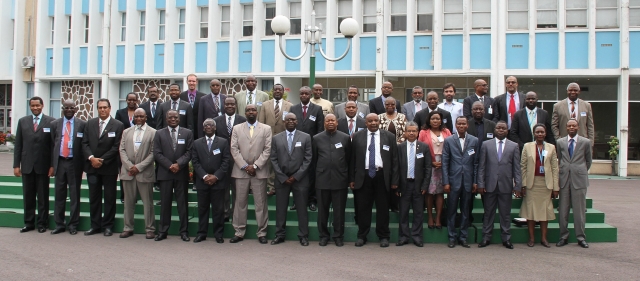Experts meet to discuss a range of public health issues in the African Region
 65th session of Programme Subcommittee begins
65th session of Programme Subcommittee begins
Brazzaville, 16 June 2015 – A range of public health issues pertinent to the WHO African Region is the focus of discussions during the four-day Programme subcommittee meeting which began this morning in Brazzaville, Congo. The Programme subcommittee comprises representatives of Member States from the WHO African Region and representation from the Executive Board.
The four-day meeting will review agenda items and resolutions to be discussed by Health Ministers during the forthcoming Regional Committee to be held in N’djamena, Chad from 31 August – 4 September 2015.
Among the issues to be discussed by the Programme Subcommittee are: a review of achievements made in our Region towards the attainment of health-related MDGs and the post 2015 health development agenda; Regional orientation on the implementation of PB2016-2017, lessons learnt from the Ebola Virus Disease outbreak, reports on the establishment of the African Centre for Disease Control (CDC); and the African Public Health Emergency Fund (APHEF) respectively. The PSC will also review a Research for Health strategy which is aimed at strengthening National Health Research Systems of countries in the Region.
In a message read on her behalf by Dr Joseph Cabore, the Director of Programme Management, Dr Matshidiso Moeti, the WHO Regional Director for Africa, drew attention to the resolutions and decisions of the just concluded global governing bodies meetings including the PBAC, Executive Board and the Health Assembly. She noted that the Health Assembly approved the Progamme Budget 2016-2017 with an increase of voluntary contribution by 8% which in effect requires more accountability in delivering results, improving equity and strengthening of internal controls across the Region. She observed that the Organization is undergoing programmatic, governance and managerial reforms and measures have been put in place to implement these reforms at Regional and Country Office levels.
Referring to the consequences of the Ebola virus disease outbreak, Dr Moeti said: “It is important for the Region to learn from this devastating experience in order to build resilient health systems for addressing future outbreaks”. She cited community dialogue and better understanding of culture as some of the critical lessons learnt from the epidemic.
The Regional Director, pointed out that this is the first PSC as the Regional Director and her priorities are; improving health security by tackling epidemic-prone diseases, emergencies and new health threats, driving progress towards equity and universal health coverage through health systems strengthening; pursuing the post-2015 development agenda while ensuring the MDGs are completed; tackling the social and economic determinants of health and building a responsive and results-driven WHO Secretariat.
The Programme Subcommittee elected Dr Makie Taal of The Gambia as Chairperson. He told the delegates that the matters to be discussed are key public health issues of regional concern and urged them to recommend concrete actions for consideration by the Health Ministers at the Regional Committee.
________________________
For more information, please contact:
Dr Marion Motari, motarim [at] who.int (motarim[at]who[dot]int); Tel: ++47-241-399910
C. Boakye-Agyemang, Boakyeagyemangc [at] who.int (Boakyeagyemangc[at]who[dot]int); Tel +47-241-39420, | Cel: +242 06 614 2401
Dr Cory Couillard, Couillardc [at] who.int (Couillardc[at]who[dot]int); Tel +47-241-39995


